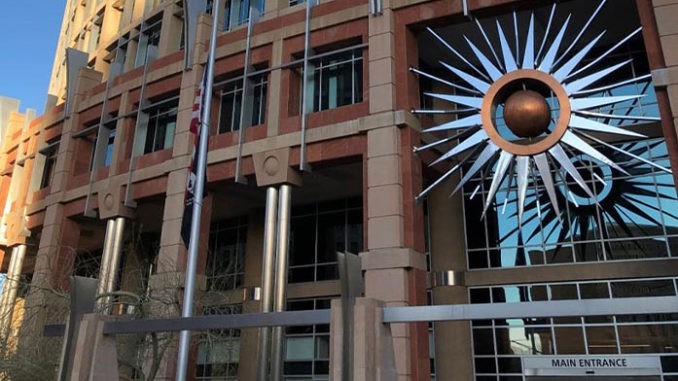
by Staff Reporter | Feb 24, 2025 | Economy, News
By Staff Reporter |
The Phoenix-based Nikola Corporation filed for bankruptcy this week — Arizona gave millions in incentives and tax credits to the company over the past five years.
Nikola develops electric- and hydrogen-powered vehicles. The company’s bankruptcy comes after years of federal investigations for fraud concerning the company’s innovation and development claims.
In 2019, Nikola received $1.3 million in pre-approved incentives based on projections. That year, projected new jobs were estimated at 400 and the average wage of projected new jobs was estimated at $80,500. The Arizona Commerce Authority (ACA) earned Project of the Year by the Area Development Magazine for bringing on the company.
In 2020, ACA awarded Nikola the highest single pre-approved A-1 incentives grant out of seven awardees for the Arizona Competes Fund Program: $3.5 million. That year, ACA projected Nikola capital investment to be at around $1 billion. Projected new jobs were estimated at over 2,000, with the average wage of projected new jobs at $65,000.
That was the year Nikola had an estimated value of $30 billion.
ACA also gave Nikola a pre-approval for a $7.1 million tax credit. In 2021, ACA then post-approved Nikola for a $6 million tax credit as part of the Qualified Facility Incentive Program. Nikola was one of 19 businesses to receive the award that year.
The company paid $125 million in a settlement to the Securities and Exchange Commission (SEC) that year, though Nikola didn’t claim wrongdoing.
In 2023, ACA pre-approved Nikola for a $3.74 million tax credit as part of the Qualified Facility Incentive Program. Nikola was one of 24 businesses to receive the award that year.
That year, Nikola founder Trevor Milton was convicted of fraud and sentenced to four years in prison for making false and misleading claims to encourage investor demand. Despite resigning from the company in 2020 and the federal investigations into Milton, ACA continued to give millions in financial incentives to Nikola.
The Department of Justice (DOJ) in its announcement of Milton’s sentencing described Nikola’s promise as a mirage:
“Milton made false claims regarding nearly all aspects of Nikola’s business, including: (i) false and misleading statements that the company had early success in creating a ‘fully functioning’ semi-truck prototype known as the ‘Nikola One,’ when MILTON knew the prototype was inoperable; (ii) false and misleading statements that Nikola had engineered and built an electric- and hydrogen-powered pickup truck known as ‘the Badger’ from the ‘ground up’ using Nikola’s parts and technology, when MILTON knew that was not true; (iii) false and misleading statements that Nikola was producing hydrogen and was doing so at a reduced cost, when MILTON knew that in fact no hydrogen was being produced at all by Nikola, at any cost; and (iv) false and misleading claims that reservations made for the future delivery of Nikola’s semi-trucks were binding orders representing billions in revenue, when the vast majority of those orders could be cancelled at any time.”
AZ Free News is your #1 source for Arizona news and politics. You can send us news tips using this link.

by Daniel Stefanski | Feb 5, 2025 | Economy, News
By Daniel Stefanski |
A bill to keep unwelcome tax increases away from unsuspecting Arizona taxpayers cleared its first body of the state legislature.
On Monday, the Arizona Senate passed SB 1013 with a 17-12 vote. One Democrat member of the chamber, Senator Burch, did not vote. All Senate Republicans voted to approve the legislation, while all Democrats in attendance voted in opposition.
If passed by the Arizona Legislature and signed into law, the bill would “prohibit the common council of a municipality or the board of supervisors of a county from increasing an assessment, tax or fee without a two-thirds vote of the governing body.”
In a statement accompanying the news of the Senate vote, President Warren Petersen, the sponsor of the bill, said, “I’ve received a number of concerns and complaints from Arizonans who are frustrated with recent hikes on taxes and fees, especially in this era of inflation. We want government to be more efficient with taxpayer dollars, and this is a step in the right direction. This commonsense taxpayer protection requires the same threshold from local governments as the Legislature when raising or imposing fees. We want to make sure government fully funds its obligations, but we also want to protect our citizens from unnecessary taxation.”
Last month, the proposal cleared the Senate Government Committee with a 4-3 vote. All Republicans voted in favor of the bill, while all Democrats registered votes in opposition in committee.
On the Arizona Legislature’s Request to Speak system, representatives from the Republican Liberty Caucus of Arizona, Barry Goldwater Institute for Public Policy Research, Arizona Free Enterprise Club, Arizona Chamber of Commerce, National Federation of Independent Business, Republican Liberty Caucus of Arizona, and Home Builders Association of Central Arizona, signed in to support the bill. Representatives from the Arizona Municipal Water Users Association, City of Casa Grande, Sierra Club – Grand Canyon Chapter, City of Bisbee, Coconino County, the Arizona Center for Economic Progress, League of Arizona Cities and Towns, City of Tucson, signed in to oppose the legislation.
SB 1013 now makes its way to the Arizona House of Representatives for consideration. If passed by the state House, it would then make its way to the Governor’s Office for its fate. Governor Katie Hobbs, a Democrat, would likely veto the bill.
Daniel Stefanski is a reporter for AZ Free News. You can send him news tips using this link.

by Daniel Stefanski | Feb 2, 2025 | Economy, News
By Daniel Stefanski |
An Arizona lawmaker has introduced a bill to solve the murky funding situation with the stadium of the hometown professional baseball franchise.
Last week, State Representative Jeff Weninger filed HB 2704 to “create a dedicated funding source needed to maintain Chase Field and keep it a world class facility for baseball and other events.” The proposal comes as the stadium lease for the Arizona Diamondbacks is set to run its course in 2027.
In a statement accompanying his press release, Weninger, the Chairman of the House Commerce Committee, said, “The Arizona Diamondbacks are an indispensable part of our state’s identify and economy. I’m proud to sponsor HB 2704, which provides a dedicated funding solution to renovate Chase Field and ensure the Diamondbacks remain right here in Arizona where they belong. With the departure of the Coyotes last year, it is more important than ever to take proactive steps to protect the future of our teams and the venues that make them possible.”
Representative Weninger added, “The Arizona Diamondbacks are a pillar of our community, and Chase Field has been a cornerstone of Arizona’s sports and entertainment scene for decades, welcoming millions of fans and creating unforgettable memories. That’s why there’s widespread interest in finding a sustainable solution. HB 2704 is a crucial step toward preserving Chase Field and ensuring it continues to be a world-class venue for generations to come.”
According to the information provided by Weninger’s release, HB 2704 “would recapture sales and income taxes associated with Chase Field and the Arizona Diamondbacks and direct them to a fund dedicated to repairing and maintaining the ballpark. The concept mirrors the Arizona Sports and Tourism Authority, which is responsible for the maintenance and funding of State Farm Stadium – the west valley home of the Arizona Cardinals. The Diamondbacks would also provide most funds necessary for the repairs required for the continued upkeep of their stadium.
The President, CEO, and General Partner of the Arizona Diamondbacks, Derrick Hall, also released a statement to endorse Weninger’s bill and encourage its passage through the Arizona Legislature. He wrote, “We are thrilled with all the momentum and positivity surrounding this legislation. We greatly appreciate the hard work and commitment from all who are delivering this public-private partnership to save baseball at Chase Field. Our ballpark has provided memories to fans and their families for over 27 years, and we will now reestablish and maintain it as one of the premier venues in the game with this funding, and the hundreds of millions the team is committed to investing. This solution avoids any new taxes and demonstrates civic pride for a franchise that cherishes its role in creating jobs, impacting the economy, bettering the community, and providing an exciting product.”
Daniel Stefanski is a reporter for AZ Free News. You can send him news tips using this link.

by Daniel Stefanski | Jan 26, 2025 | Economy, News
By Daniel Stefanski |
The State of Arizona is fast-tracking a tax reduction policy through the legislature that became a staple of President Donald J. Trump’s campaign platform over the past year.
This week, the Arizona House of Representatives Committee on Ways and Means passed HB 2081, which would exempt taxation on tipped wages from the state’s individual income tax.
State Representative Gail Griffin, a Republican who was the sponsor of this legislation, said, “I worked in the service industry years ago and understand the challenges tipped employees face. Tips are an expression of appreciation from customers for services provided. Tips are gifts and, in my opinion, should not be taxed. HB 2081 ensures that Arizonans who rely on tips to support themselves and their families can keep more of their hard-earned money. I’m grateful to Chairman Olson for making this the committee’s first bill for the session.”
Another Republican lawmaker, State Representative Neal Carter, added, “A key feature of a good taxation system is voluntary compliance and simplicity of administration. Tips are often paid in real time and in strange amounts. Taxing tips simply punishes the honest because strict compliance is difficult to achieve.”
As a candidate for President, Trump announced his plan for no federal taxes on tips back in June in the State of Nevada. Shortly after Trump’s announcement last summer, his Democrat opponent, then-Vice President Kamala Harris, mirrored his proposal in an attempt to woo voters on the campaign stump. On Inauguration Day this week, the newly minted Commander in Chief riffed that he thought his campaign may have secured the State of Nevada’s electoral votes in the November General Election because of that promise.
A poll from The Associated Press-NORC Center for Public Affairs Research earlier this month showed that 54% of respondents would strongly or somewhat favor eliminating taxes on earnings from tips.
The U.S. Bureau of Labor Statistics estimates that there are 2,277,900 waiters and waitresses across the country.
The bill passed the Arizona House committee along a party-line vote – 5-3, with one Democrat member absent.
According to the Arizona Legislature’s Request to Speak system, representatives from the Republican Liberty Caucus of Arizona, Arizona Licensed Beverage Association, and Fraternal Order of Police AZ State Lodge, signed in to support the bill. Representatives from Living United for Change in Arizona, the Arizona Center for Economic Progress, and Rural Arizona Action opposed the legislation.
HB 2081 will soon make its way to the floor of the Arizona House of Representatives for a vote from the full chamber.
Daniel Stefanski is a reporter for AZ Free News. You can send him news tips using this link.

by Daniel Stefanski | Jan 24, 2025 | Economy, News
By Daniel Stefanski |
Arizona Democrats are standing behind a budget proposal from the state’s governor.
Late last week, Governor Katie Hobbs released her budget for Fiscal Year 2026 for the State of Arizona. Hobbs, a Democrat, championed her priorities of “opportunity, security, and freedom for Arizonans” in a statement that accompanied her budget proposal, which was the third of her first term in office as the state’s chief executive.
The top Democrat lawmakers in both chambers of the Arizona Legislature were quick to respond. House Democratic Leader Oscar De Los Santos said,“The Governor’s budget is tightly aligned with our Caucus priorities in several key ways —especially with its focus on affordability, affordability, and affordability. While greedy corporations try to fleece and price-gouge working families, we must do everything we can to slash costs. Thankfully, the Governor has put forward solid and workable plans to cut costs for childcare, housing, and more — which give us an excellent starting place for the bipartisan negotiations that it will take to pass a budget that works for every Arizonan. As the chaos and tariffs of the incoming Trump Administration threaten to drive up prices on basic necessities like food and healthcare, it’s more important than ever that here in Arizona we make much-needed investments to protect hard-working families and make life more affordable.”
Senate Democratic Leader Priya Sundareshan added,”I applaud the Governor and her team for their work and dedication to putting forward a fiscally responsible budget proposal. This proposal has a desperately needed focus on ensuring Arizona is an affordable place to live, raise a family, and build a business. It is my hope that Republicans choose to partner with the Governor to adopt the outlined common-sense constraints on the out-of-control universal ESA voucher scheme. The strain of this program paired with years of irresponsible Republican budgeting have left our state in critical need of the investments this proposal seeks to make in Tribal communities, working families, affordable housing, and responsible groundwater management.”
Arizona Democrat legislators will likely be on the outside looking in at another process of budget negotiations in a divided state government. Over the past two years, Republican legislative leaders have spearheaded negotiations for the fiscal packages with Hobbs and her team from the Ninth Floor of the Governor’s Office. Republicans have also been able to protect all their priorities from Democrats throughout those budget agreements, while managing to extract significant concessions from Hobbs and Democrats.
Daniel Stefanski is a reporter for AZ Free News. You can send him news tips using this link.

by Matthew Holloway | Jan 21, 2025 | Economy, News
By Matthew Holloway |
A recent study from Search Logistics has yielded an encouraging result for the Phoenix metro area, ranking the city as the 14th best city in the nation for young entrepreneurs. The survey from the UK SEO firm ranked the fifty most populous cities in the U.S. by analyzing co-working affordability, wage data, internet infrastructure, tax data, cost of living, and personal income.
According to the study provided to AZ Free News, each of the determining factors was assigned a rank value out of 100 and the overall index score was calculated to produce a ranking. Although Phoenix was outstripped by Florida cities Jacksonville, which ranked #1, and Tampa in second place, followed by Texas centers like Fort Worth, Houston, San Antonio, in the Southwest there seemed to be a consistent pattern: cities in conservatively governed, business-friendly states ranked best with the exception of Baltimore, MD.
- “The city that was revealed as the best for young entrepreneurs was Jacksonville, FL, with an overall index score of 70.91 out of 100. Jacksonville ranked best in cost of living, with a score of 92.82 out of 100.
- Following in second place was Tampa, FL, with an index score of 70.35 out of 100. Tampa reported the best internet speed of any city in the study, with an average download speed of 180.5 Mbps. This meant that it scored 100 out of 100 for this factor.
- In third was Indianapolis, IN, with an index score of 69.10 out of 100. The city performed well among the cost of living factors, producing a score of 95.98 out of 100.
- Baltimore, MD, ranked fourth, generating an index score of 67.08 out of 100. Baltimore’s best category was cost of living, with a perfect score of 100 out of 100.
- Rounding out the top five was Fort Worth, TX, with an index score of 65.15 out of 100. Notably, Fort Worth was among several cities that offered the lowest minimum wage of $7.25, which meant it scored the maximum 100 out of 100 for this factor.
- Completing the top 10 best cities for young entrepreneurs were Houston (63.45), Philadelphia (63.14), San Antonio (62.71), Raleigh (62.60), and Charlotte (62.17).”
Conversely, cities which would be traditionally associated with the growth of big tech and finance like New York, Los Angeles, San Francisco, Seattle, Washington, D.C., Portland, and Chicago ranked low. Matthew Woodward, a spokesperson for Search Logistics said, “While it may be tempting to start a business in New York or California, young entrepreneurs locating to a city in another state may pay off significantly, especially while their venture is still in its infancy. Young entrepreneurs will be able to reap the benefits of all that these cities have to offer and enjoy living in a city that will support their work as much as possible.”
Notably, Mesa, AZ, was excluded from the rankings, owing to a lack of co-working space available. This was also true of Fresno, CA; Bakersfield, CA; Long Beach, CA; Oakland, CA; and Arlington, TX.
Woodward added, “This ranking may provide some clarity for young and budding entrepreneurs wondering where to launch their business. This can often be a difficult decision to make as there are many factors to consider, such as cost of living, tax regulations, access to co-working spaces, and internet infrastructure. Fortunately, certain cities will likely be more conducive to business owners and allow their enterprises to flourish easily.”
“According to the ranking, cities in southern states, such as Florida, North Carolina, and Texas, tend to be some of the best for young entrepreneurs. Many of these have a lower cost of living and are therefore more affordable options.”
Matthew Holloway is a senior reporter for AZ Free News. Follow him on X for his latest stories, or email tips to Matthew@azfreenews.com.






